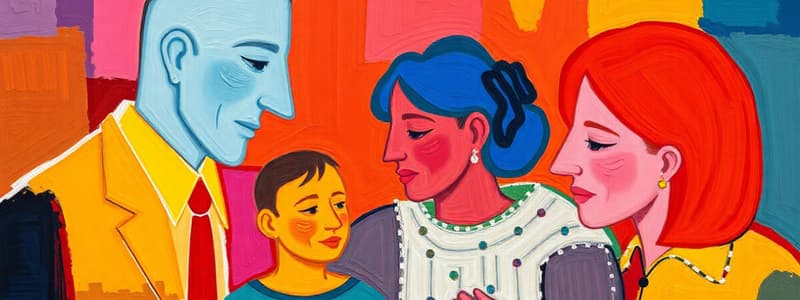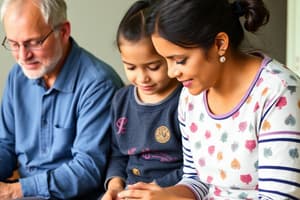Podcast
Questions and Answers
What societal change has made divorce a more acceptable option?
What societal change has made divorce a more acceptable option?
- Strengthening of traditional family values
- Secularisation of marriage views (correct)
- Higher rates of arranged marriages
- Increased importance of financial stability
How do unrealistic expectations contribute to divorce?
How do unrealistic expectations contribute to divorce?
- They foster deeper connections between partners.
- They lead to satisfaction in relationships.
- They can cause disappointment and disputes. (correct)
- They enhance communication between partners.
What role does communication play in marital relationships?
What role does communication play in marital relationships?
- It decreases emotional attachments.
- It helps in avoiding financial discussions.
- It is the foundation of all relationships. (correct)
- It is a minor aspect of a successful marriage.
Which act provides financial assistance for those unable to afford divorce costs?
Which act provides financial assistance for those unable to afford divorce costs?
How has women's financial independence influenced modern marriages?
How has women's financial independence influenced modern marriages?
What is a potential consequence of one partner having a chronic illness?
What is a potential consequence of one partner having a chronic illness?
Which factor contributes to a woman's economic independence in a welfare state?
Which factor contributes to a woman's economic independence in a welfare state?
What type of relationship dynamic may lead to domestic violence?
What type of relationship dynamic may lead to domestic violence?
What emotional responses might individuals experience during a divorce?
What emotional responses might individuals experience during a divorce?
Which factor makes it easier for parents to divorce compared to previous generations?
Which factor makes it easier for parents to divorce compared to previous generations?
What can be a result of frequent arguments between partners?
What can be a result of frequent arguments between partners?
What are some positive coping mechanisms during divorce?
What are some positive coping mechanisms during divorce?
What type of abuse is considered a form of domestic violence?
What type of abuse is considered a form of domestic violence?
What type of socialisation occurs primarily during the first five years of a child's life?
What type of socialisation occurs primarily during the first five years of a child's life?
Which of the following is considered a result of secondary socialisation?
Which of the following is considered a result of secondary socialisation?
What does anticipatory socialisation involve?
What does anticipatory socialisation involve?
Which institution is primarily responsible for primary socialisation?
Which institution is primarily responsible for primary socialisation?
What is the informal social control used by peer groups primarily aimed at?
What is the informal social control used by peer groups primarily aimed at?
How does mass media influence individuals according to the content?
How does mass media influence individuals according to the content?
Which of the following embodies the concept of resocialisation?
Which of the following embodies the concept of resocialisation?
What role do religious institutions typically play in socialisation?
What role do religious institutions typically play in socialisation?
What is a main impact of a peer group on behavior?
What is a main impact of a peer group on behavior?
How do formal agents of social control differ from informal agents?
How do formal agents of social control differ from informal agents?
What societal change has contributed to the rising acceptance of divorce?
What societal change has contributed to the rising acceptance of divorce?
Which of the following is not a reason associated with the increasing incidence of divorce?
Which of the following is not a reason associated with the increasing incidence of divorce?
What role does the state play in the socialisation process?
What role does the state play in the socialisation process?
What is a common emotional effect of divorce on children?
What is a common emotional effect of divorce on children?
How can emotional distress caused by divorce affect mental health?
How can emotional distress caused by divorce affect mental health?
Which family structure is formed after a divorce when individuals remarry?
Which family structure is formed after a divorce when individuals remarry?
What role does primary socialization play in learning gender roles?
What role does primary socialization play in learning gender roles?
What is the concept of the glass ceiling?
What is the concept of the glass ceiling?
Which of the following does NOT represent a negative coping mechanism post-divorce?
Which of the following does NOT represent a negative coping mechanism post-divorce?
What is meant by 'sexual division of labor' in the context of gender roles?
What is meant by 'sexual division of labor' in the context of gender roles?
How do teachers play a role in reinforcing gender roles?
How do teachers play a role in reinforcing gender roles?
Which of the following is a potential impact of divorce on a family's standard of living?
Which of the following is a potential impact of divorce on a family's standard of living?
What does gender equality refer to?
What does gender equality refer to?
Which of the following best illustrates occupational segregation?
Which of the following best illustrates occupational segregation?
How do mass media influence gender roles?
How do mass media influence gender roles?
What term describes the difference in treatment boys and girls receive regarding household responsibilities?
What term describes the difference in treatment boys and girls receive regarding household responsibilities?
Which of the following factors do NOT contribute to social isolation after divorce?
Which of the following factors do NOT contribute to social isolation after divorce?
Study Notes
Agents of Socialisation
- Socialisation is the process of learning societal norms and values.
- Agents of Socialisation are institutions or individuals that influence social norms and values.
- Primary Socialisation occurs during early childhood (first five years), focusing on basic norms and values, like language, walking, and etiquette.
- Secondary Socialisation involves learning more universalistic norms and values, like competition, respect, and punctuality.
- Anticipatory Socialisation is preparing for future roles, such as a parent-to-be imagining their future as a parent.
- Resocialisation is adapting to a new social position or status. This can be either voluntary, like a drug addict seeking rehab, or mandatory, like a mentally ill patient in an asylum.
Family as an Agent of Socialisation
- The family is a primary agent of socialisation, crucial to a child's early development and the acquisition of basic norms and values.
- Parents often treat boys and girls differently based on gender expectations, influencing children's perception of their roles in society.
- This can be seen through toys, dress codes, expectations of behaviour, and assigned tasks.
- Ann Oakley describes these influences as manipulation, canalisation, and different activities and verbal appellations.
- Informal sanctions (rewards like smiling or gifts, punishment like shouting) are used to encourage or discourage specific behaviours.
School as an Agent of Socialisation
- School acts as a secondary agent of socialisation, teaching universal values and skills.
- The hidden curriculum (unintentional lessons) promotes values like respect for authority and conformity.
- The school curriculum can further reinforce gender roles. Boys often take subjects like math and science, while girls are encouraged into subjects like English and history. This reflects gendered expectations within society.
- Teachers may subconsciously treat boys and girls differently, reinforcing gendered stereotypes.
- Schools are formal agents of social control, employing formal sanctions like praise, rewards, detentions, and punishments to guide behaviour.
Peer Group as an Agent of Socialisation
- The peer group is a significant informal agent of socialisation, influencing behavior, interests, and self-identity.
- Peer interactions shape perceptions, habits, and interests, acting as a reference group for individuals.
- This can be very influential in establishing social norms and values.
- Informal sanctions (rewards like inclusion and smiles, punishment like ostracization) are used to encourage or discourage behaviours.
Mass Media as an Agent of Socialisation
- Mass media acts as a one-way agent of socialization, shaping perceptions and values.
- Its representations of gender, age, and social groups influence individuals' understanding of reality.
- Media can impact behaviours as viewers often imitate or copy what they find interesting.
- The influence of media is potentially problematic especially when it comes to portraying violence and aggression.
Religious Institutions as an Agent of Socialisation
- Religious institutions socialize people into moral values and ethical guidelines that influence everyday life.
- Through teachings, rituals, and cultural events, individuals learn about shared values and responsibilities.
- These institutions promote a "collective conscience," contributing to societal control and order.
- Religion's impact on social control is evident through its teachings on right and wrong.
Workplace as an Agent of Socialisation
- The workplace is a secondary agent of socialisation, introducing individuals to professional culture and expectations.
- This can be seen in dress codes, rules and regulations, teamwork, communication.
- It's a formal agent of social control employing formal sanctions such as promotions and bonuses for good performance, and demotions or termination as punishment.
State as an Agent of Socialisation
- The state socializes individuals into understanding their rights and responsibilities as citizens.
- It establishes rules and regulations to control behaviour, using formal sanctions like fines or imprisonment.
Gender Roles
- Gender refers to the socially constructed differences between men and women, influenced by cultural norms and expectations.
- Gender roles encompass societal expectations and beliefs about how men and women should behave, defining masculinity and femininity.
- Sexual division of labour refers to the division of tasks within the family based on gender.
- Gender equality promotes equal access to social goods, services, and opportunities for all, regardless of gender.
- Gender equity focuses on ensuring fairness and justice in treatment between men and women.
Gender Roles as Learned through Agents of Socialisation
- Family: Primary socialisation plays a crucial role in establishing gender roles. Parents often treat children differently based on gender, influencing their understanding of their roles in society.
- School: The school curriculum and teachers' expectations can further reinforce gender roles. This can be seen in subject choices, classroom dynamics and teacher-student interactions.
- Workplace: Gender roles are reflected in occupational segregation, with certain jobs perceived as masculine or feminine. Women often face barriers to career advancement known as the "glass ceiling."
- Mass Media: Media portrays stereotypical gender roles, perpetuating expectations and influencing perceptions of masculinity and femininity.
- Religion: Religious texts and practices often prescribe gender roles and expectations, shaping social customs and norms.
Studying That Suits You
Use AI to generate personalized quizzes and flashcards to suit your learning preferences.
Related Documents
Description
Explore the various agents of socialisation and their roles in shaping individual values and norms. This quiz covers primary, secondary, anticipatory, and resocialisation, focusing on the family's crucial influence during early development. Delve into how these processes affect societal integration and personal growth.




